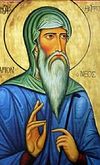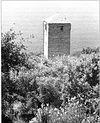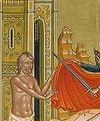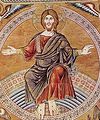

| Previous day | Next day |
| Old Style
February 14
|
Sunday |
New Style
February 27
|
| Meat-fare Sunday. Tone 3. | No fast.
|
![]() St. Auxentius, monk, of Bithynia (ca. 470).
St. Auxentius, monk, of Bithynia (ca. 470). ![]() St. Cyril, Equal-to-the-Apostles, teacher of the Slavs (869).
St. Cyril, Equal-to-the-Apostles, teacher of the Slavs (869).
St. Maron, hermit of Cyrrhus (ca. 433). St. Abraham, bishop of Charres in Mesopotamia (5th c.). St. Isaac, recluse of the Kiev Caves (ca. 1090). Translation of the relics of Martyrs Prince Michael and his counselor Theodore, of Chernigov (1578). St. Hilarion the Georgian (the New) of Imereti and Mt. Athos (1864).
New Hieromartyr Onesimus (Pylaev), bishop of Tula (1937).
St. Peter, patriarch of Alexandria (380). Hieromartyr Philemon, bishop of Gaza. New Martyr Nicholas of Corinth (1554). New Monk-martyr Damian of Philotheou and Kissavos, at Larissa (1568). New Martyr George the Tailor, of Mytilene, at Constantinople (1693). St. Raphael, bishop of Brooklyn (1915). St. Ephraim of Katounakia (1998).
Repose of Archimandrite Barsanuphius of Valaam and Morocco (1952), Righteous Barbara (Arkhangelskaya) the Recluse, of Ufa (1966).
Thoughts for Each Day of the Year
According to the Daily Church Readings from the Word of God
By St. Theophan the Recluse

Meat-fare Sunday (35th). [I Cor. 8:8–9:2; Matt. 25:31–46]
The great judgement! The judge cometh in the clouds, surrounded by a countless multitude of bodiless heavenly powers. Trumpets sound over all the ends of the earth and raise up the dead. The risen regiments pour into the determined place, to the throne of the Judge, having already a foreboding of what verdict will sound in their ears, for everyone’s deeds will be written on the brow of their nature, and their very appearance will correspond to their deeds and morals. The division of those on His right hand and those on His left will be accomplished in and of itself.
At last all has been determined. Deep silence falls. In another instant, the decisive verdict of the Judge is heard: to some, “Come,” to the others, “depart.” “Have mercy on us, O Lord, have mercy on us! May Thy mercy, O Lord, be on us!” they shall say, but then it will already be too late to plead. We need to take the trouble now to wash away the unfavourable marks written upon our nature. Then, at the judgment, we would be ready to pour out rivers of tears in order to wash ourselves; but this would do no good. Let us weep now, if not rivers of tears, then at least streams; if not streams, then at least drops. If we cannot find even this much, then let us become contrite in heart, and confess our sins to the Lord, begging Him to forgive them, and promising not to offend Him any more through violation of His commandments. Then, let us be zealous to faithfully fulfil this promise.
Articles
 Venerable Isaac the Recluse of the Kiev Near CavesSaint Isaac was the first person in northern lands to live as a fool for Christ. |
 St. Raphael Bishop of BrooklynFrom his youth, Saint Raphael’s greatest joy was to serve the Church. |















